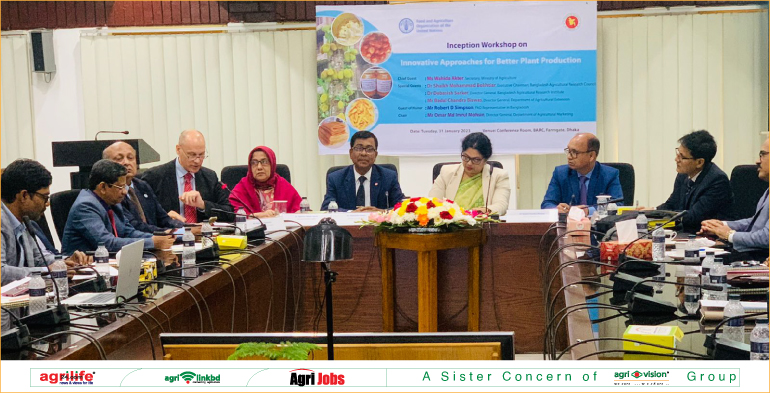
A new project will support small-scale farmers and entrepreneurs to benefit from the country’s national fruit.
Agrilife24.com:Nutritious jackfruit is one of the most important and widely grown fruits in the country but its potential has been largely unexploited. The project, which will be implemented by the Food and Agriculture Organization of the United Nations (FAO), is dedicated to promoting the production and marketing of jackfruit. An inception workshop was held today at the Bangladesh Agricultural Research Council (BARC) in Dhaka.
FAO Representative in Bangladesh Robert D. Simpson said: “Jackfruit has great potential, as recognized by the Government and FAO, and this project is about exploiting that potential. Bangladesh can undoubtedly gain a significant share of the international market for a variety of jackfruit-processed products that are in high demand globally.”
In terms of annual production, jackfruit is the second largest fruit in the country after mango, accounting for more than one-fifth of total fruit production. It contributes significantly to the nutrition of the people of Bangladesh as a source of vitamins, minerals, and calories. Despite these nutritional benefits and largely untapped export potential, jackfruit has received little attention for value addition in the country.
Only 12 plant species account for 75 percent of global food supply. Therefore, it is crucial to make use of underutilized resources, particularly Special Agricultural Products (SAPs) such as jackfruit to improve food security, nutrition, and livelihoods on a large scale.
The Government of Bangladesh selected jackfruit under FAO’s ‘One Country One Priority Product” (OCOP) initiative. Eighty countries from five FAO regions were designated as potential project countries, with the goal of promoting 50 SAPs. Bangladesh was selected as one of the first five demonstration countries, along with Egypt, Malawi, Trinidad and Tobago, and Uzbekistan.
The project, called ‘Innovative Approaches for Better Plant Production’, will support countries to implement the OCOP initiative by promoting innovative approaches for better crop production and SAPs marketing. The project will strengthen food security, improve daily balanced diets, and increase the incomes of smallholders and family farmers in Bangladesh who grow jackfruit.
Chief guest at today’s event was Wahida Akter, Secretary, Ministry of Agriculture. The workshop was chaired by Omar Md. Special guests were Imrul Mohsin, Director-General, Department of Agricultural Marketing; Dr. Nazmun Nahar Karim, Executive Chairman (Routine Charge), BARC; Debasish Sarker, Director-General, Bangladesh Agricultural Research Institute (BARI); and Badal Chandra Biswas, Director-General, Department of Agricultural Extension.
What is the OCOP initiative?
FAO launched the Global Action on Green Development of Special Agricultural Products: “One Country One Priority Product” (OCOP) in September 2021 based on the FAO Strategic Framework 2022–31. The OCOP promotes inclusive, profitable, and environmentally sustainable food systems through green development of Special Agricultural Products (SAPs) that include optimizing the structure, functionality, and service of SAPs production systems; minimizing losses of crop yields and biodiversity, food loss and waste, misuse of agricultural chemicals, and maximizing integrated agricultural profits to enable the transition to more efficient, inclusive, resilient, and sustainable agrifood systems.
What are Special Agricultural Products (SAPs)?
Special Agricultural Products (SAPs) are the agricultural products with unique qualities and special characteristics associated with geographical locations and cultural heritages. They are an important example of underutilized resources that can significantly contribute to ensuring food security and healthy diets, supporting farmers’ livelihoods and economic growth while protecting the environment and biodiversity. SAPs include all kinds of agricultural products, recognized (or having the potential to be recognized) as symbolic national or local agricultural products, but have not benefited from local agricultural and rural development programmes to the extent of commonly grown staple crops (e.g. rice, wheat, maize, soybean and potato). SAPs have huge potential to be integrated into local, regional, and global markets and trade.





















